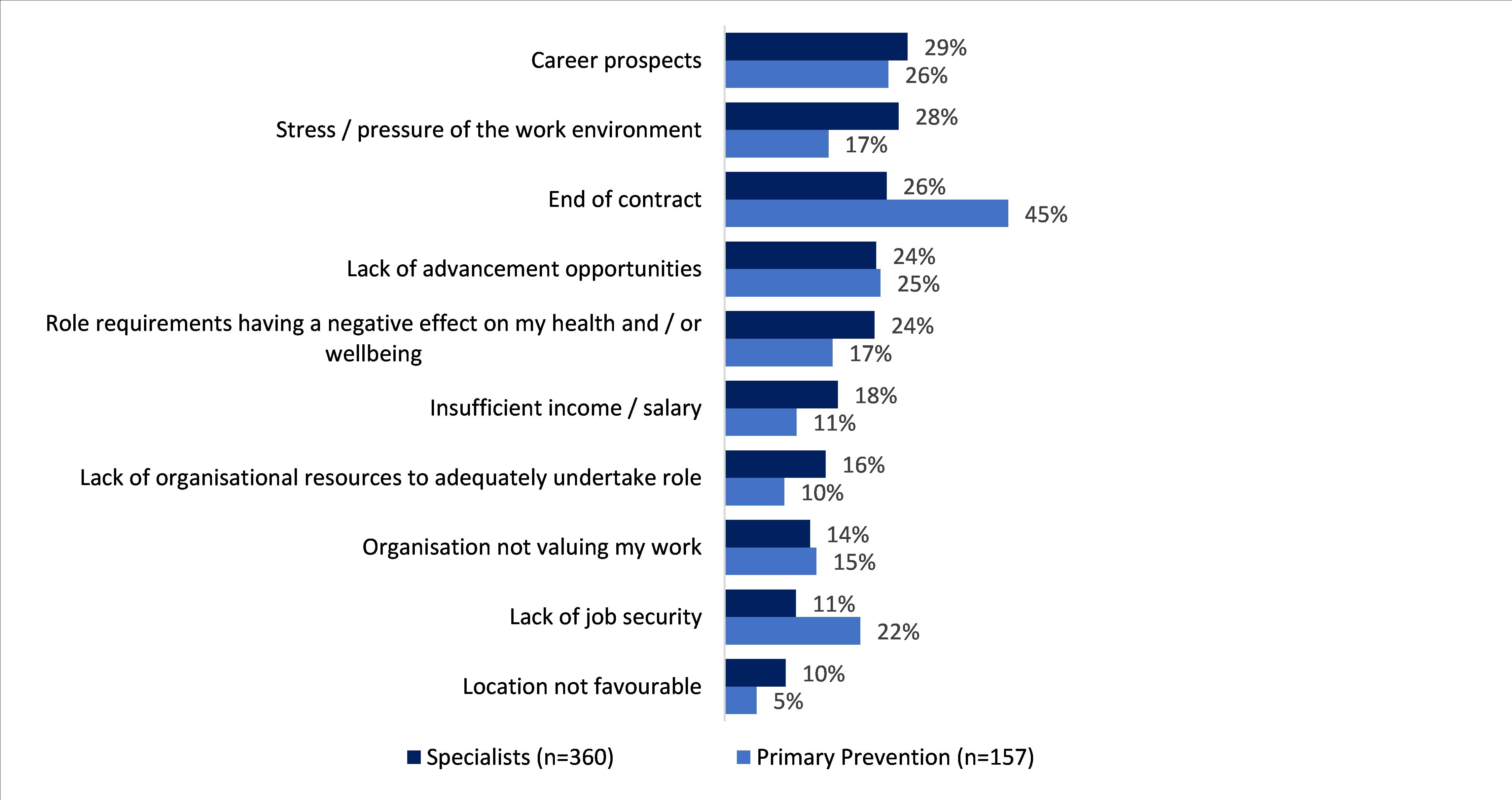Motivations in current role
As illustrated in Figure 4, the results illustrated that both the specialist family violence response and primary prevention workforces were highly motivated by a commitment to preventing / responding to family violence.
Respondents were also asked to comment on what they were doing immediately prior to commencing employment in their current role. The main responses from those working in the specialist and primary prevention workforces were that they were ‘working for another organisation or agency in the sector’ (41% and 35%), or ‘working in a related sector’ (23% and 26%).
Future intentions
Specialist Family Violence response
When asked about their future intentions, responses across the specialist and primary prevention workforces were broadly similar. Just over half (51%) of specialists did not have plans to leave their current role at this stage, whilst 40% did plan to leave their current role and 10% were unsure.1
Of those who did intend to leave their current role, 44% were planning to leave for another role within the specialist family violence response workforce. A similar proportion (40%) were planning to leave their current role for another role outside of this workforce.
The main reasons that had driven specialists to consider leaving their role within the next 12 months included career prospects or lack of advancement opportunities (24%-29%); and stress / pressure or the role having a negative effect on respondents’ health and wellbeing (24%-28%). Furthermore, 26% also cited an end of contract (see Figure 5).
Primary Prevention practitioners
Amongst Primary Prevention practitioners, 43% did not have plans to leave their current role at this stage, whilst 48% did have plans to leave their current role, and 9% were unsure.2
Of those who intended to leave their current role, 31% planned to leave their current role for another role within the family violence primary prevention workforce and 41% planned to leave their current role for another role outside of the family violence primary prevention workforce.
The main reason cited by this cohort for intending to leave their role in the next 12 months was due to an end of contract (45% - see Figure 5), though 25-26% also cited career prospects and a lack of advancement opportunities.
Furthermore, most specialists indicated that they would consider taking on a role in the primary prevention of family violence workforce in the future (81%), and just over half of those working in primary prevention reported that they would be open to a role in the specialist family violence response workforce (53%). This suggests that there is potentially an opportunity for shared resources across the specialist family violence response and primary prevention workforces. Table 11 below presents the education levels of those who participated, to assist in broadly understanding the backgrounds of each workforce and future planning.
| Specialist family violence workforce (n=1,409) | Primary prevention n=448) |
Broader workforce aggregate (n=2,587) |
|
|---|---|---|---|
|
Year 11 or below |
5% |
5% |
9% |
|
Year 12 |
22% |
22% |
24% |
|
Certificate I |
0% | 0% |
1% |
| Certificate II | 1% | 0% |
2% |
| Certificate III | 4% | 2% |
6% |
| Certificate IV | 11% |
12% |
14% |
| Diploma or Advanced Diploma | 25% | 19% | 27% |
| Bachelor's Degree | 49% | 51% | 47% |
| Graduate Diploma or Graduate Certificate | 23% | 20% | 21% |
| Postgraduate Degree | 32% | 38% |
25% |
| PhD | 2% | 3% | 1% |
| Prefer not to say | 1% | 1% | 1% |
Footnotes
- Q71. Thinking about your future, do you have plans to leave your current role? (n=1,409)
- Q71. Thinking about your future, do you have plans to leave your current role? (n=446)
- Q74. Which of the following have you completed?
Updated

